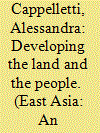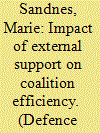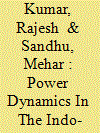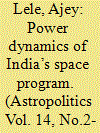| Srl | Item |
| 1 |
ID:
139540


|
|
|
|
|
| Summary/Abstract |
Social development in Xinjiang Uyghur Autonomous Region from 1999 to 2009 is the focus of this article. I will explore the current situation among Uyghurs and Hans living in Xinjiang in different social contexts and purviews, mainly assessing problems and open questions hindering a balanced and consensus-based social development in the area. The concept of “development” per se will be understood with a critical perspective. The fieldwork was conducted in 2011 and 2012 in Urumqi, Turpan, Kahsgar, Wujiaqu and Shihezi, and in eight rural villages—seven located in the Kashgar Prefecture and one in Kizilsu Kyrgyz Autonomous Prefecture. The opportunity to adopt an “insider perspective”, at the same time working with critical tools provided by the disciplines of sociology and anthropology, can be considered an important asset in the field of Xinjiang studies. My PhD research in China (2010–2013) and my work as consultant for KFW (2011–2012) have been of great help in adopting this approach. Interviews, participant observation and analysis of quantitative and qualitative data from different sources are the basis of the fieldwork results presented here. UNDP indicators and indexes are taken as reference in setting and organising data.
|
|
|
|
|
|
|
|
|
|
|
|
|
|
|
|
| 2 |
ID:
151232


|
|
|
|
|
| Summary/Abstract |
This article examines the role of power interchanges in hindering collaborative efforts over shared water resources in the Eastern Nile River. We track the formative process of riparian countries’ narratives, showing how they problematize the watershed differently in accordance with the typology of power dimensions laid out under a proposed framework called Power on Water to Water Policy (PWWP). The framework presented attempts to give: (i) a power analysis of the riparian countries’ interactions, and (ii) a prescription of intervention avenues for river basin governance. The use of scientific literature and interviews triangulate data collection to ensure a more accurate analysis. Application of the PWWP framework is shown to contribute an original perspective to watershed management, enabling first, a comprehensive understanding of the Eastern Nile River situation from a power and institutional perspective and second, the identification of elements disrupting effective implementation of water resources management in the watershed.
|
|
|
|
|
|
|
|
|
|
|
|
|
|
|
|
| 3 |
ID:
192609


|
|
|
|
|
| Summary/Abstract |
This article examines the extent to which external actors influence the efficiency of the G5 Sahel Joint Force’s (G5S-JF) chain of command and what this means for the relationship between the G5S-JF and external actors. I argue that external actors have taken leading roles within the G5S-JF’s chain of command and that this external influence has increased the efficiency of the joint force’s command. This suggests that the relationship between the G5S-JF and external actors follows the logic of hegemonic theory, with external actors providing efficiency and stability through a strong leading voice, as other scholars have previously assumed. However, I demonstrate that there are limitations to a hegemonic understanding of this relationship, as it does not take into account the agency of the joint force. In fact, as things have developed, the hegemonic stability logic rather appears to have been proven wrong as the strong leading role of external actors was a contributing factor to Mali’s withdrawal in May 2022 and the subsequent instability of the joint force.
|
|
|
|
|
|
|
|
|
|
|
|
|
|
|
|
| 4 |
ID:
193410


|
|
|
| 5 |
ID:
149790


|
|
|
|
|
| Summary/Abstract |
Space power is a relatively nascent discourse that is gaining importance globally. This article examines India’s space program within the global context in order to understand the shifting power balance in the space arena. The article first clarifies contextual variants of the definition of power, recalibrating those formulations to the space context. This is followed by an examination of the Indian space program—its evolution historically, current limitations, and increasing relevance today. Space is a versatile domain and, due to its interconnected nature, it impacts the world. Hence, this article also examines global engagements and collaborative efforts being made across borders, and the strategic modalities involved in traversing such sensitive diplomatic terrain. Finally, the article concludes by reiterating the soft power and hard power potentials of the space arena, whose versatility contributes towards intrinsic national growth and extrinsic power projections.
|
|
|
|
|
|
|
|
|
|
|
|
|
|
|
|